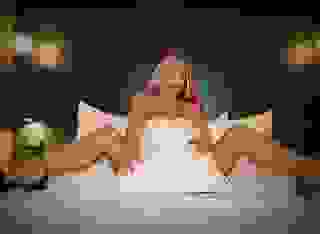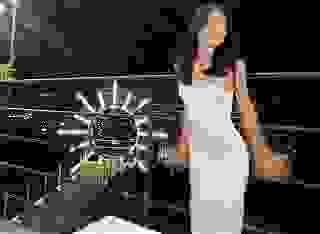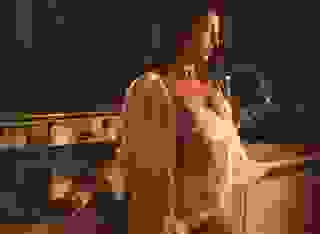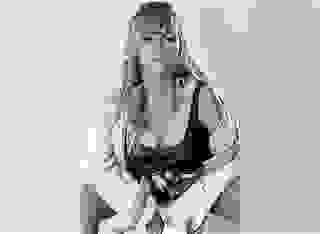- Novels and Novellas
- The Eighty-eighth Key Ch. 15
Note: You can change font size, font face, and turn on dark mode by clicking the "A" icon tab in the Story Info Box.
You can temporarily switch back to a Classic Literotica® experience during our ongoing public Beta testing. Please consider leaving feedback on issues you experience or suggest improvements.
Click hereThe Eighty-eighth Key
Part III
Chapter 15
____________________________________
"What is, do you suppose, the difference between a dream and a nightmare?" Werner Heisenberg asked, his settled hands resting on his lap, his entire demeanor expressing openness to her reply.
And yet, Imogen now remained resolutely still, as if she was suddenly and utterly quite incapable of speech.
He inhaled sharply as he waited, then gently shook his head. "Then let me tell you," he continued. "You can never control the outcome of a nightmare, dearest Imogen. A nightmare comes calling, doesn't it? Quite unbidden, yes?" He stood and walked over to the piano in her solarium and sat there, waiting in vain for her to come to him. "And there is nothing you can do to prevent its coming, is there? Our dread fascination with death keeps us from waking, doesn't it?"
Yet she still remained fixed in time and space, her eyes lost within the certainty of the moment. Saul and Avi had gathered all the university's scientists and they were even now making their way to Sweden - with the help of British and American commandos who had miraculously arrived just in time to assist the group. All she had to do was stall Werner long enough to keep him from acting in time to prevent their escape.
Werner began playing the opening to Saint-Saëns Aquarium and she felt her Will dissolving as the music took hold, and without realizing it she began to sway as the music washed over and through her. Struggling to regain control she stood and walked over to her favorite window, and there she looked out over her mother's garden. She focused on the order she saw in her mother's work, all the while refusing the music, doing her best to turn away from the prying chords.
And even when the music stopped she remained absolutely still, waiting for the final assault she knew was coming.
"You know, if there was a way I could let you remain here, I would do so," Heisenberg sighed. "Well, I would move heaven and earth to make that happen. But, dear Imogen, you must understand that I only have your best interests in mind when I tell you that you all will be safer with me and my group in Leipzig than if you remain here. The political activities of your friends have drawn too much scrutiny, and I can no longer protect them all, so you must help me, Imogen. I understand what you are doing, this playing for time, but you must also know that I will have to take you with me. So I ask you once again, do you truly understand the difference between a dream and a nightmare?"
She turned and faced him, looked past him to the old grandfather clock standing like a sentinel across the room before she smiled inside. "It is time, Werner."
"Indeed? How so?"
"We must leave now, the two of us."
"Leave? And where are we to go, Imogen?"
"Leipzig, Werner."
"So, you come willingly?"
"Of course."
He studied her face for a moment before he sighed again, and he realized in that moment that she had beaten him. Worse, he alone understood that by sacrificing herself to let the scientists flee she had chosen the nightmare. He looked at the resolve in her eyes with wonder, then he gently led her from her father's house to the Mercedes parked on the street, and he helped her inside before he walked over and spoke with the small group of Gestapo.
"They plan on leaving this evening. You might have time to detain them before they flee," he lied - and forever sealing her fate. "I am taking her to Leipzig straight-away."
Saul Rosenthal watched from the safety of nearby shadows, and when it was safe he turned away from everything he knew and followed his love into the darkness.
_______________________________
Callahan sat with his mother at her Bösendorfer, and he tentatively worked his way through the opening notes of Gershwin's Prelude No 2, the easy symmetry of the original arrangement for piano as comfortable as the moment might allow. She had always recoiled from Gershwin, his loose harmonic structures apparently biting into her like a pair of ill-fitting shoes, but she seemed more open to him now, more accepting of his lusty American motifs.
Sam and Stacy Bennett, and Al Bressler too, looked-on from across the living room of the house in the compound just outside of Tel Aviv, the three of them now all too aware of the fragile contours of Imogen Schwarzwald's day-to-day existence - as well as the delicate relationship she maintained with her son, their friend. Al Bressler, of course, had no knowledge of Harry's ability on the piano, and he sat - in dumbfounded silence - as his old friend worked his way through piece after piece, trying to coax his mother out of her latest bout of melancholia.
She had seemed receptive, even talkative when Harry first led her to the piano, then he had played something by Camille Saint-Saëns and it was as if her world imploded. They had all watched in silent horror as she fell-in upon herself, withering into a hunched shell of herself as her son drifted through the first lines - but by then it was too late. Harry saw it too, and he forced the passage to drift towards Respighi's The Villa Medici Fountain at Sunset, and she seemed to rally for a moment - before, in the end, she gave way to an unseen, infinite sorrow.
He went back to Gershwin, this time to the Prelude, and he forced her to play with him.
"I know how much you hate his music," Harry whispered to her, "but please try, Mom."
"I don't hate Gershwin, my son. I resent him, and above all else, I resent his refuge in easy optimism to be almost revolting."
"What?"
"Go back to Respighi for a moment. Now try to feel the music, Harry. Feel the vibration of the notes, of the elemental chords. Through your fingers, if you can, or try with the side of your face. That's it. Rest your face on the piano just there while you play the notes, and let the vibrations play through you..."
Callahan played for a long time, searching for some kind of meaning...
"I'm not sure what you mean," he said after several minutes.
She sighed, then positioned her hands over the keyboard...
"Beethoven was deaf when he wrote the Ninth," she said as she played. "so how did he do it? Through recall alone? No, but he could still feel, Harry. He could feel the music, but think on this for a moment, would you? When you feel the power of the Ode to Joy, when you truly feel it within the structures of vibration, you feel exactly what Beethoven felt. When Strauss wrote his Death and Transfiguration how could he have known what death felt like? Yet when he died decades later his final words were that he was feeling exactly what he had written thirty years before. Should you want to feel death, you might want to learn to feel what Strauss created, yet do so with your face, or within your fingertips."
"What has that got to do with Gershwin, Mom?"
"With the Second Prelude, Harry, he begins with such profound respect for sorrow, yet by the second passage he absolutely revels in an exuberance that seems so infernally out of place! It's as though he can't help himself, Harry! He created such a lush, expressive exposition of sorrow, yet then he seeks an easy refuge in that awful Bohemian ragtime of the 20s. He either didn't know understand what he was doing, or his was a profoundly disturbed soul."
"Disturbed? I see a man walking through a park, lost in thought. Some happy, others less so. It's a walk through life, one path leading to another, and another..."
"Is that what you feel?"
"Yes. Every time. It's a journey."
"A journey? Or is it your journey, Harald?"
"Of course it's mine."
She laughed. "Ha! That's rather impetuous, don't you think. Or worse still, simply naive."
"Naive?" Harry bristled. "How so?"
"As a musician playing the works of another, you have to understand that what you are conveying is nothing short of the composer's feelings. When you play Gershwin, you are in a literal sense in touch with his feelings within the moment of creation. His thoughts and feelings, on a purely elemental level. Nothing more, nothing less. You may relate to the music in some peripheral sense, or you may wish to make it your own in some way, but what you are in fact experiencing is George Gershwin, pure and simple. Not Harald Callahan. And in order to become an artist, Harald" she said, pausing for emphasis, "you must learn to feel exactly what Gershwin felt. Feel precisely the way Gershwin felt. And Beethoven, and Strauss. You can always choose to be a hack musician and play the notes in their prescribed order off the printed page, or you can learn to see within the music, to seek out the composer's feelings. Only then can you possibly hope to allow others to experience the same magic."
"And to you Gershwin's feelings are..."
"Incongruous. Distortions. Almost madness. How can one write about a melancholy journey and then slip into a ragtime dance...?"
"Because life is rarely so simple as a linear progression," Stacy Bennett said, now standing above them.
"In life, perhaps," Imogen sighed, now exasperated, "but not within a single composition."
Harry looked up at Stacy, clearly shocked. "Why not, Mom?"
"Because, my poor Harry, life is simple. There is nothing beyond our suffering, nothing beyond the pain of this morbid existence. Everything else is a mask. The mask we wear to hide behind. To keep our suffering out of view."
"I'm not sure I understand, Mom."
As she collected her thoughts, Imogen seemed to collapse inward on herself once again. "I've lived a life of secrets, Harald. Cut off from my feelings..."
"Cut off?" Stacy asked. "How so...?"
"Cut off...yes," she whispered as she slumped over, slowly leaning on Harry's shoulder. "Oh God, no. There he is again..."
"Mom? Mother? There who is again? What are you seeing?"
"If it is as now as it has always been," Avi Rosenthal said as he walked into the solarium, "it is the bearded man with his cane. When he comes I lose her for days. Sometimes weeks."
Harry looked up at Avi, now standing beside Stacy, and he seemed uncharacteristically lost, somehow a man out of time. Harry knew that look, too. Avi's countenance was the expression of a man used to keeping secrets, and then Harry remembered that this old man kept secrets for a living...
Harry Callahan closed his eyes and began playing Saint-Saëns Aquarium once again - and immediately he felt his mother stiffen. Like the puppet master had suddenly taken control of her strings...
"Mother...? Play the notes for me," he said as he stopped playing. "Play the notes you're feeling right now."
"I can't."
"Yes, you can."
"No, Harald. This I must never do."
"You must not?" Stacy asked. "What will happen, Imogen?"
"Some secrets..." she started to say, but then she fell away from the trap, fell into an impossible torpor.
"I think that's all for now," Avi said, rushing to Imogen's side. "Harry? Would you help me with her...to the bedroom, I think..."
But Harry held out his hand, blocked Avi's way. "No, not yet."
He began playing Saint-Saëns again, this time simply - like a student learning the piece might - and then he deliberately stumbled once -
"Not like that," she stammered, then her hands were flying over the keys - playing the piece in its entirety with a force and clarity Harry thought impossible...
And when she finished she sat up straight and looked her son in the eye. "You must learn to feel, Harald. You were never good at feeling the truth of the moment."
"No?" Harry said quietly. "I suppose you're right."
"You always hid your feelings from us. From your father. From me. And from June."
"I never hid my feelings from June!" Harry stammered, his voice shaking now. "How could you say that!"
"Then why did she...?"
"Don't say it, Mother. Don't you dare blame me for that."
"Why did she murder your son, Harald. Why? What drove her to that precipice? Can you at least tell me that much?" She turned and looked at her son, her eyes now full of furious malice. "She asked me for help, you know. Help. To find a way to kill that baby."
"And did you? Did you help her?"
"I gave her the number to the student health services at the university. I don't know what she did after that."
"Don't you?" Harry growled. "And why is that, Mother...?"
"And you still pretend to not know..." She seemed to strengthen as her words bit into him, and to Stacy, it appeared as if she was taking strength from beating him down... "Because she was so beneath you, Harald. She was trash, her self-loathing a disease that infected everything she touched, and..."
"And what?" Harry cried. "You wanted to kill any part of me she might bring into this life?"
"Yes. Precisely so, Harald." She turned to the keyboard and played the Gershwin prelude with perfect precision, yet when she finished, when she looked up in triumph, Harry and his friends were gone.
And she would never see him again.
Avi looked down at her and slowly shook his head.
'So many secrets,' he said as he sighed, before he too turned and walked away from all her jealous secrets.
__________________________________
Frank Bullitt listened to the wiretap recording once again, then the Israeli agent put another tape in the player and the group huddled closer to hear the latest...
"They're in Israel," the disembodied voice said.
"What? How do you know?"
"One of Al Bressler's friends from Vice is on his honeymoon, in Jerusalem. Saw him there, apparently followed him. He had heard about the assassination, so he thought something was hinky since Al was supposed to be dead, and he followed him. Bressler was with some stewardess, found out she works for El Al; then he followed them to a compound just outside Tel Aviv."
"This friend...? Is he...?"
"Yup. He's sympathetic but won't join."
"How'd he know who to contact?"
"Don't know," said the voice on the tape.
Bullitt hit the pause button then looked at the lead FBI agent; he was from the Los Angeles field office of the FBI, and he seemed dialed-in and concerned about the implications of the overall investigation. "Okay. Do we have any identities yet?" Bullitt asked, and the agent shook his head.
The Israeli agent coughed once, and Bullitt turned to look at him. "Yes?"
"Do you care about their identities? Why not just take them out?"
"What?" the lead FBI agent asked, clearly startled by the implications.
"You have an, ooh, what is the word? An infestation...no? Do you want an unknown number of show trials on television? Endless revelations about corruption within a number of police departments in the area? Or perhaps consider another option? Simply stamp out the infestation?"
"Well," the FBI agent began, "let's consider, first, due process considerations. These are U.S. citizens on American soil. Killing them is not an option. Publicity is not a major concern, either..."
"Perhaps," one of the other Israelis asserted, interrupting the agent, "if you knew the identity of the group's leadership you would reconsider. What if, for instance, one of the department's assistant chiefs is implicated?"
"What are you not telling us?" Bullitt said, his steady gaze leveled at this senior Israeli agent.
Who simply shrugged. "We became involved after several Jewish organizations contacted us. We are here simply to help maintain good relations between our countries."
"Yeah," the FBI lead said. "We got that part...about two dozen times already."
Bullitt cleared his throat: "Let's just say, for purposes of conversation only, that you know the identities and locations of these bad actors. Would you, hypothetically speaking, be in a position to do something about it?"
"You're Bullitt, are you not? San Francisco homicide?" the senior Israeli asked.
"Yessir."
"Well, we now have evidence of a wide-ranging plot against Jewish citizens in your country, and now we have further proof that an intelligence operation against Jewish citizens of your country is now active on Israeli soil. You must understand that we are not, therefore, constrained by your legal niceties. We have found that in the past such matters can lead to very undesirable outcomes. You must, therefore, understand that we operate under very different auspices."
"And you must understand," the lead FBI agent said, "that we will not take part in any such unilateral action."
The lead Israeli agent smiled. "Ah. Then we understand one another." The Israeli then turned to Frank Bullitt. "Since the target of these so-called vigilantes have been members of your department, indeed, members of the homicide bureau, we would like your advice for the next week or so. Is this a problem?"
Frank looked at the Israeli, then at the lead FBI agent - who only shrugged before he turned and looked away in apparent disgust.
"No sir, I don't think that'll be a problem," Bullitt said, his beaming grin more than a little disconcerting to the other FBI agents in the room.
______________________________________
Jim Parish sat beside An Linh in a taxi making its way across the Bay Bridge several days after their arrival in the States; she had taken news of Harry Callahan's death with remarkable calmness - yet even so Parish knew still waters run deep, and hers might be the deepest of all. He had watched intently as she grew progressively more restive, and when it became more than obvious that she needed some sort of closure to begin the healing process he had contacted the San Francisco PD; in time he was connected to a Lieutenant Frank Bullitt in the Criminal Investigative Divisions Homicide Bureau. After a brief conversation with the detective, Parish agreed to bring An Linh to the city, to the Potrero Hills area south of downtown, and there she could meet with and talk to Harry's father, Lloyd Callahan. She might, Bullitt implied, find what she was looking for there.
The taxi pulled up in front of an old Mission-style bungalow on Texas Street; it was, he saw, a small house by American standards, but it was beyond well-kept and exuded a simple, quiet elegance beyond anything else in the neighborhood. Bullitt was leaning on the front of an unmarked police car, waiting for them, and Parish noted the way the lieutenant cast an appreciative eye as An Linh exited the taxi and walked over to greet him.
"Major Parish?" the detective asked. "Nice to meet you. And you are Harry's friend?" Bullitt said to An Linh, gently smiling. "Mister Callahan is waiting for us, so let's come along."
They walked up the stone steps to the deep front porch that spanned the width of the house, and soon an older man opened the door and stepped out to greet his son's friends...
Parish immediately noticed the resemblance between father and son; Lloyd Callahan was tall and seemed to have been carved from a single block of hard, gray granite. His eyes were dark gray and the color almost matched the thatch of his wavy hair, and soon he found little snippets of Harry everywhere he looked...the way the senior Callahan moved his hands, the soothing tones of his calming voice when he spoke with An Linh about her relationship with his son, and how his demeanor shifted from frank curiosity to open acceptance when he learned that An Linh and his son had been much more than friends.
And they talked for hours, or so it seemed, and all the while Detective Bullitt sat and listened politely, attentively, as he too learned more and more about An Linh's harrowing journey to America. And as he listened he grew more and more conflicted, and at certain points in the conversation, it was all he could do to not 'spill the beans' and tell this girl whose life had been nothing but an avalanche of shattered dreams that things were not all that they now must seem...
...until Lloyd Callahan mentioned that two detectives from the department had dropped by the evening before, questioning him about any details he might know concerning his son's murder. But that wasn't what had concerned Frank most.








